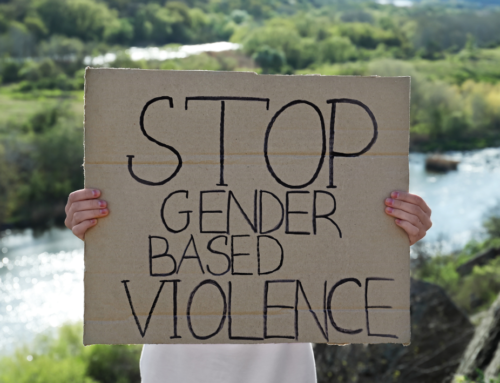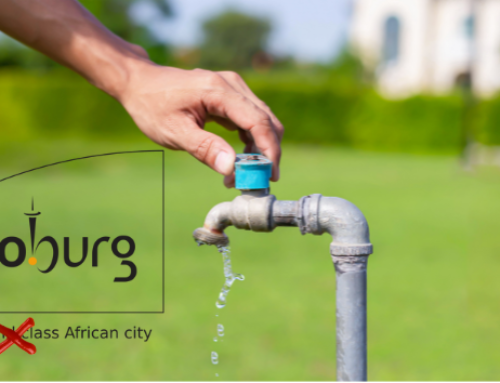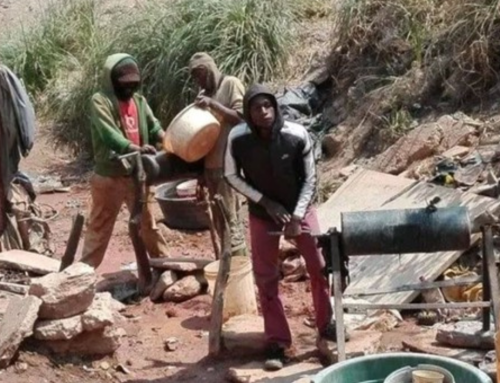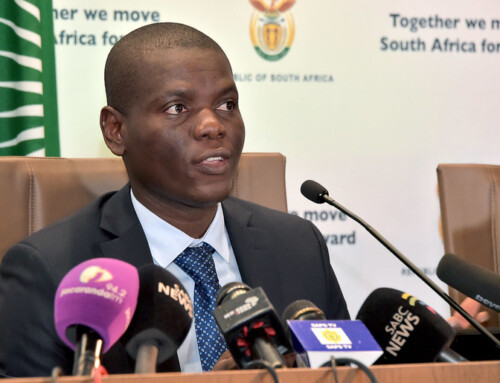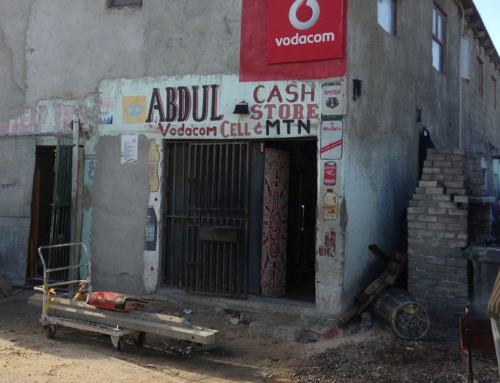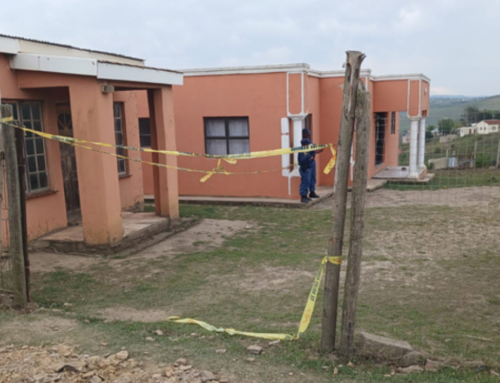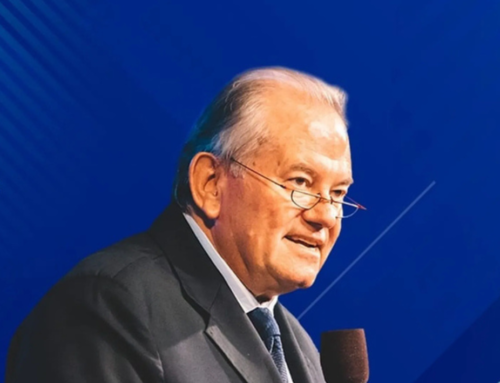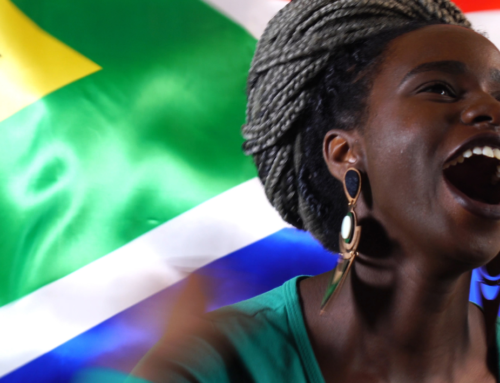|
|
 Foreword by the President
Foreword by the President
Thirty years into our democracy and our beautiful country, South Africa, is in crisis. There is a disconnect between the people and their government.
The main contenders over and above the usual suspects are joblessness, (violent) crime, lawlessness and violence, poor economy, loadshedding, water, poverty, incompetence, and corruption as well as the influx of people from all-over seeking refuge and resources from the state.
A whopping R1 billion was spent on just one of the aforementioned icebergs; corruption. Yet the Judicial Commission of Inquiry into Allegations of State Capture’s work seems to be for naught, because its Report is gathering dust at Parliament. Because the ruling party is fingered in the Zondo Commission’s Report, we should not be surprised at this. Those identified by the Zondo Commission cannot be trusted to find solutions to corruption.
We have heard of names like Bosasa, Chancellor House and the Guptas to name but a few. Don’t let anyone pull the wool over your eyes, the ruling party has for decades had their hands directly in the proverbial cookie jar in order to sustain itself. No one is left to wonder who the real State Capturers are.
The Tripartite Alliance partners have forgotten the original agenda. Their economic policies have not delivered more jobs or more investments, instead billions of Rands are leaving this country daily without any hope that it will ever come back. Notwithstanding President Ramaphosa’s empty promises that his so-called investment conferences would bring in Billions of rands of investment, they have not materialised.
The Tripartite Alliance partners strategically positioned themselves on bogus empowerment projects for their own benefit. For example, unions collect monies from their members in subscription fees and these monies are supposedly invested on members’ behalf in various portfolios.
Their Unemployment Insurance Fund (UIF) contributions are in turn invested by government with the Public Investment Corporation (PIC), yet we have recently heard of the scandals involving these funds and schemes. Meanwhile, the people who have sacrificed their monies languish in poverty and joblessness. The UIF is in shambles, where retrenched workers are shown the door without their benefits being paid out. The National Student Financial Aid Scheme (NSFAS) is another example of a government project that has been hijacked by corrupt elements. The list is endless.
Misuse of state resources sees medical doctors and nurses protesting in the streets that they are not employed, yet our hospitals are short-staffed. Other experts and professionals are snatched from our shores, and the brain-drain is a daily occurrence.
Lawlessness and crime, especially violent crime, continue unabated. South Africa today is the murder capital of the world and gender-based violence is a scourge eating at the fabric of our society. As a result, local and international investors, are seeking other investment destinations.
Where economic growth is concerned, the current government has failed to invest in its people and improve the productive capacity of the economy. Areas such as manufacturing, agriculture and engineering, as well as other critical skills, have been neglected. The ruling party government inherited a functional infrastructure, which it neglected to maintain and did not expand upon to cater for a growing nation. Nowhere is the lack of maintenance more evident than in our energy infrastructure, which has led us to the point where loadshedding is accepted as a daily part of our lives.
State-owned enterprises (SOEs) have been run to the ground. For example, with the South African Post Office, where the elderly are sent from pillar to post with contradicting explanations as to why their pensions are late, being paid only a portion of, or not paid at all.
South Africa is a country endowed with rich natural resources, and we must ensure that these resources are utilised for the benefit of our people. Nature reserves must exist in harmony with the tourism industry and to the advantage of the communities in their close proximity. Where mineral resources are concerned, there are far too many illicit mining operations (zama-zamas) and there must be greater adherence to existing legislation.
Everyone agrees that one-party dominance perpetuates corruption, and corruption destroys our freedom. There is only one solution, the 2024 National and Provincial Elections are the perfect occasion to rid this nation of the real State Capturers.
All the problems that have been highlighted above, necessitates South Africans to commit to rebuilding our country. We cannot afford to continue on the slippery slope of corruption, governmental neglect and national degradation. We must embark on a structured conversation to come up with a strategy, with timeframes, to achieve this goal. It is the responsibility of every South African to take part in the programme to rebuild this country.
South Africa requires a new dispensation that shall appoint government officials based on merit. Where the justice system receives immediate attention, and our collapsing infrastructure is fixed as soon as possible. A new dispensation which will engage with the Southern African Development Community (SADC) with the view to close ranks, to make sure this region is not targeted as a dumping-zone to protect our economies. We need a new dispensation that views foreign policy through the lens of national interest.
The United Democratic Movement (UDM) is a social democratic party with a strong moral sense, in both the social and economic areas. We advocate for a dispensation where our people can become wealth creators in their own right, so that there is less dependence on government. But that government must do more to create a conducive environment for our people to thrive.
Vote UDM!
Mr Bantu Holomisa, MP
President of the United Democratic Movement
1. Good governance
Corruption scandals and abuses of power that negatively impact on service delivery constantly challenge South Africa. This ranges from petty corruption such as bribery of low-level government officials, right to top ranking officials. At centre stage is government and those who are in its service, who do not care about the money they manage on behalf of the taxpayer and the people who it is supposed to benefit.
In 2023 alone, there were numerous corruption scandals that rocked the nation amounting to billions of Rands, not to mention scandals of the preceding decades and those infamously exposed in the Judicial Commission of Inquiry into Allegations of State Capture (the Zondo Commission).
The culprits who have looted state resources hide behind struggle credentials and, in many instances, loyalty is rewarded with protection against investigation and prosecution. There is a clear lack of political will to implement performance and consequence management. The Zondo and Mpati Commissions’ reports are languishing at Parliament, because of this very reason.
Even the President of this country declines to release the performance reports of his Cabinet, citing that he is scared these reports will embarrass government and his party. Mr Ramaphosa even stated that he was “willing to fall on the sword” rather than reveal the names of those who abused public funds.
There is an increased use of consultants, because cadre deployment results in the appointment of incompetent and unqualified individuals. Government services therefore cost so much more. To make matters worse, once a political directive laced with corruption, comes from above, those lower down the chain make use of the opportunity to pad tenders to line their own pockets. At other times they collude with consultants for their own benefit.
Regarding state-owned enterprises (SOEs), corruption and maladministration are so pervasive that it is no wonder that they are failing and sinking deeper and deeper into trouble. Time and again SOEs are bailed out using taxpayers’ monies that is meant to uplift the nation. This practice of baling out SOEs using Public Investment Corporation (PIC) funds risks the Government Employees Pension Fund that is invested with the PIC.
A UDM government will:
• As one of its highest priorities, untie the tangled web of corruption where SOEs are concerned.
• Ensure that there are significant consequences for those found guilty of corruption, and not just issue a slap on the wrist as we have seen with the ruling party.
• Restore the powers of accounting officers so that political heads do not usurp the powers of accounting officers.
• Professionalise the civil service to reduce the reliance on consultants.
• Respect the Public Service Commission as the body responsible for making governmental appointments in line with policy.
• In order to improve government services and employees’ morale, review governmental promotion policies and salary packages.
To ensure clean governance a UDM government will implement the following principles:
• Zero-tolerance for corruption and abuse of power.
• Effective procedures and special courts will be established to investigate and prosecute those in the public and private sector involved in corruption.
• Independent anti-corruption task teams will be established in each province to determine the level of corruption and to immediately introduce recovery steps.
• Promote the ethics of good governance through codes of conduct and corporate governance.
• Government officials and politicians must serve the people and not themselves.
• Integrity, commitment, and hard work are required from all in government and in the private sector with a name and shame programme as well as blacklisting.
• Professionalisation of the public service, with the best quality ensured in all appointments, so that merit, responsibility and integrity is guaranteed, and excellence is rewarded.
• A sense of pride in, and ownership of, government will be encouraged and nurtured in all South Africans by establishing a new ethical framework of incorruptibility, accountability, transparency, and impartiality in governance.
1.1. Service delivery and civil disobedience
We witness periodic flair-ups of violence involving communities protesting about a lack of service delivery. What is however worrying, is the anger, vandalism, and signs of defiance that people display during these protests and marches, whether it be community protests, industrial action or crowds attending court cases. Even our children and students turn to violence and destruction of property when they wish to express their dissatisfaction with the slightest issue.
Poor service delivery is the root cause of the dissatisfaction. It only adds petrol to the fire when government ignores communities’ pleas for attention.
Service delivery is the most critical factor of each and every department within the Public Service and to ensure effective governance a UDM government will implement the following principles:
• Measurement of each department by the services they deliver and the difference these services make to the quality of life of each South African.
• A professional, efficient, and customer-centric public service, committed to delivering quality services to citizens as a constitutionally enshrined right.
• Regular training and upskilling of public servants.
• Delivery of services without prejudice and favouritism by public servants
• Neatness in dress and a discipline code, as well as etiquette in civil service, will be enforced.
2. Economy
Global economies are confronted by a range of geopolitical challenges and conflicts the effect of which are high energy and fuel prices, high inflation and disruptions in global trade, which have had a negative impact on the South African economy. These have caused a cost-of-living crisis globally and in South Africa, with devastating effects on the poor. Yet this does not discount, or excuse, thirty years of economic policy uncertainty and gross mismanagement of the South African economy perpetrated by the ANC government.
Under the ANC government, South Africa’s economic growth is less than 1% per annum and the unemployment rate has reached crisis levels. According to StatsSA, the real unemployment is 41,2%, while youth unemployment stands at approximately 70%. South Africa’s debt to GDP ratio stands at 73.6% (R5.84 trillion). The budget deficit stands at about 5%. However, the governing party’s rampant corruption, governance failures, economic policy uncertainty and sheer incompetence have inflicted the most damage on the South African economy, which constitutes a betrayal by the ANC to build a better life for all.
A new national economic consensus is required in order to develop a broadly shared and fully supported economic policy framework for South Africa. Below is an outline of how a UDM government will address the economy.
2.1. Manageable public debt and budget deficit
Over the past fifteen years, government expenditure has steadily outpaced revenue due to the ruling party’s booming corruption and economic mismanagement. This has led to an accumulation of public debt.
A UDM government will:
• Follow a model of manageable public debt and budget deficit, that has fiscal discipline as a basic tenant to ensure that government borrowing stays within reason, allowing for some flexibility to invest in infrastructure development to address imbalances and inequality whilst creating jobs.
• Never use borrowed money to fund government’s day-to-day operational expenses. Borrowed funds should be utilised in the case of investment expenditure to ensure inter-generational fiscal equity.
• To avoid sovereign debt crisis, maintain budget deficits and public deficits that are in line with international standards, as well as introducing a Debt Management Bill within the first hundred days in office.
2.2. Investment in business confidence
For thirty years, confusing ANC economic policy has muddled South Africa’s economic prospects, and we are still beset by policy uncertainty. From the Reconstruction and Development Programme (RDP) to the Growth, Employment and Redistribution framework (GEAR), then the Accelerated and Shared Growth Initiative for South Africa (AsgiSA), followed by the New Growth Path (NGP), then the National Development Plan 2030 (NDP) and most recently, Radical Economic Transformation (RET).
We have witnessed how the partners of the ruling party, without an elected mandate, have been vetoing government policies. It is this unwarranted interference of the ruling alliance partners that is one of the leading causes of policy uncertainty.
This constant chopping and changing erodes investor confidence and drives out entrepreneurship. It certainly has not done South Africa any favours where international ratings are concerned, with ratings agencies citing policy uncertainty as one of the chronic troubles hampering South Africa. To make matters worse, South Africa had even been greylisted in 2023 by the Financial Action Task Force (FATF) for failing to adequately tackle illicit financial flows and meet all eleven of the FATF’s effectiveness measures to combat money laundering and the financing of terrorism.
Because there are no clear guidelines on how to deal with direct investment our reputation as direct investment destination is negatively affected.
A UDM government will improve business and investor confidence, as influenced by perceptions regarding government and politics, amongst others, by:
• Ensuring policy consistency and certainty.
• Creating an environment that is conducive for the private sector to flourish and will place a heavy emphasis on attracting direct foreign and local investment.
• Addressing energy constraints on the economy and rising energy costs.
• Dealing decisively with the financial and governance challenges facing SOEs in order to restore investor confidence and to ensure that these entities fulfil their socio-economic developmental mandates.
• Addressing the skills shortages.
• Taking steps to root out corruption in both the public and private sectors.
• Applying a merit-based appointment system in government.
• Promoting the separation of powers between the cabinet and parliament i.e. between the executive and the legislature.
• Enhancing the role of parliament and its committees as a government perceived to be under scrutiny at all times will perform better and improve investor confidence.
2.3. Sustainable job creation
South Africa has one of the most unequal societies in the world and it also has one of the highest unemployment rates. The primary objective of government must be to stem the tide of rising unemployment with its attending adverse consequences for social and economic stability.
There are many factors that influence the unemployment crisis in South Africa, which underscores the need for a comprehensive strategy.
Irrespective of race, gender or class, every South African should have the opportunity to be productively employed and be able to contribute to the economy and society.
There has, however, been an obsession to create a middle-class and funding has been made available to create businesses through, for instance, the Public Investment Corporation and the Industrial Development Corporation. Instead of generating job opportunities and creating wealth for fellow South Africans, these funds have been used by some to buy houses and expensive cars. In addition, these loans are not serviced, and the monies are written off as bad debt. The tender system has been abused to no end, where service providers have been forwarded tranches of money to start projects and they disappear without even lifting a finger. It is clear that there is no governmental monitoring and evaluation system to adjudicate the return on investment.
Another factor which presents a major challenge is illegal immigration. The UDM believes that legal immigrants contribute to enterprise development and growth. However, it is of major concern that the incumbent government is dismally failing to deal with the matter of the employment of illegal immigrants for lower salaries, while millions of South Africans are locked outside of the labour market.
The UDM’s response to the challenge of unemployment includes:
• Identifying markets for small firms through promoting domestic and foreign connections to adequately address both the supply and demand side of the economy.
• Developing capacity in the areas of improved business and entrepreneurial skills.
• Identifying loan and capital sources, as well as facilitating loans and investments in community businesses.
• Investing in sector-based planning and implementation, including the creation of sector-specific banks to provide financial assistance to historically disadvantaged groups and individuals.
• Promoting the efficient and effective use of public resources to serve the dual goal of small business development and skills creation in the productive labour force.
• Devoting more resources to promote “buying South African” as a tool to stimulate local wealth generation and job creation.
• Launching a massive enterprise focussing on job creation through infrastructure maintenance and development. This planned sustainable development initiative shall be government driven through the Department of Public Works in coordination with all government departments.
• In the labour market, protecting South Africans, in policy and law, from unfair competition from illegal and undocumented immigrants and deal with the exploitation of illegal immigrants in the private sector. We will handle illegal immigration in a compassionate and holistic manner in line with our continental and international obligations.
2.4. Enterprise development and small, micro and medium enterprises (SMMEs)
In order to create jobs, the creative spirit inherent in South Africans must be released. Citizens can become wealth creators through a policy of small business development. Capacity can be fostered by identifying and overhauling obstacles like streamlining legislation and regulations, addressing access to capital, establishing accessible markets for products, and by appropriate education, training and skills development and a creative business spirit.
A UDM government will:
• Identify alternative and innovative financing options to assist small entrepreneurs. These options shall include the establishment of local stock exchanges, small and medium business investment corporations, community development banks, negotiations with investment and insurance funds for venture capital and the establishment of credible micro-finance institutions.
• Reintroduce government programmes (maintenance units) that employ and train the unemployed as artisans in, for instance, agricultural and community development projects. Transforming these programmes into self-sustaining, locally-owned businesses that can grow, accumulate assets and create jobs is imperative.
• Adopt a venture capital mind-set, providing seed money to local enterprises for which they would receive a share in the returns of the enterprise. Local government shall be empowered to provide resources for developing appropriate infrastructure for street traders and hawkers to support these fledgling entrepreneurs. This will encourage their important role in the economy as well as contribute to job creation and enterprise development in the local economies.
• Reserve via legislation – such as in other parts of the world – certain enterprises solely for South African citizens such as, but not limited to:
the sale of goods or provision of services in a market, petty trading or hawking or selling of goods in a stall at any place and spaza shops;
the operation of taxi or car hire service in an enterprise that has a fleet of less than twenty-five vehicles;
the production of exercise books and other basic stationery;
the retail of finished pharmaceutical products.
• Encourage partnerships between South Africans and non-South Africans in the operation of beauty salons or barber shops to encourage skills transfer.
• Unlock the role of business in developing mentorship programmes and establishing small-scale sub-contracting arrangements with local SMMEs. Such programmes must provide training and financial assistance to build upon SMMEs’ existing technical and manufacturing capabilities; improving the quality of their products and their delivery and ultimately creating successful self-sufficient suppliers.
2.5. Loadshedding
For almost fifteen years now, South Africa has been experiencing debilitating power failures due to the ANC government’s refusal and failure to invest in new power stations in order to keep up with the energy needs of our economy. It is astounding that since 2008, no successful plans have been made to dig South Africa out of this energy quagmire.
The Medupi and Kusile power plants were hailed as mega-projects that would change the energy landscape of South Africa – sadly, the nation is still waiting for these white elephants to do their intended job. The projects’ entire tender process was suspect, because of the Hitachi/Chancellor House deal (Chancellor House is the investment arm of the ANC). This is yet another example of state capture in action, where the money that was intended to benefit the people landed straight in the coffers of the ruling party. As well as being another example of how the ruling party closes ranks when their own is in the firing line, just like they did with the Nkandla and Phala Phala sagas. This is the very same party who ascended to power on the ticket of fighting for the people, yet they have betrayed the people left, right and centre and lined their pockets at the people’s expense.
Many businesses, more especially small and medium enterprises (SMMEs), are forced to shut down due to load shedding, which results in massive job losses and high poverty rates. This occurs against the backdrop of an SMME-sector that currently contributes about 40% to the South African economy. In other words, the performance of our economy depends on the success of the SMME sector.
The ANC government’s unwillingness to resolve loadshedding is responsible for the rise in poverty and unemployment. This unwillingness is not surprising given the fact that the nascent ruling elite was bought off through BEE schemes many years ago and they have used the ill-gotten gains to insulate themselves from loadshedding.
Under a UDM government:
• The main policy drivers for change in the energy industry shall be based on increased economic efficiency gains and cost effectiveness.
• Regarding the generation of electricity, Eskom’s monopolistic practices in the electricity distribution and supply, will be discarded. At present, this monopolistic system, has all but showcased the incompetence of, and inefficiency at, Eskom.
• In respect of the transmission industry, privatisation is more complex. A UDM government’s role shall be to ensure that all stakeholders in the industry have maximum possible access to the grid and in this respect an Electricity Regulator shall have an important role to play.
• Given the challenge that South Africa has lost much of its expertise and, we will propose a public/private partnership model for the privatisation of Eskom where government holds a 51% stake in the entity for the people of South Africa.
• The historic role of local government in the distribution process of electricity shall be recognised. Revenue generated in this fashion shall remain in the treasury of local government.
• Renewable energy resources should be a greater component in the energy mix of South Africa – renewable energy resources include nuclear, hydro, solar and wind related energy generation. To this end economically feasible technologies and applications shall be encouraged and implemented, if necessary, by way of incentives.
• Targets will be set for the gradual and systematic increase in the use of renewable energy resources, coupled with a reduction in the reliance on finite and environmentally unsound energy resources, taking into consideration the waste that accompanies it, for example, solar panels and batteries.
• Quality control over renewable energy products shall be exercised in order to prevent South Africa from becoming a dumping site for obsolete technologies.
• Investment shall take place in training local expertise in the utilisation of our raw materials, to have local beneficiation so that local industries may develop, where we create our own energy products (such as the manufacturing of wind-turbines, solar panels, batteries, etc.) and also to have attending employment opportunities.
2.6. Infrastructure development and maintenance
A critical factor in promoting economic growth is infrastructure development. In particular, it has a positive impact on the individuals, households, and rural communities, in terms of quality of life. Infrastructure-led growth has several economic benefits associated with it, those are, increased income, employment, productivity improvement, income redistribution, etc.
Most of the country’s infrastructure is deteriorating due to insufficient, or total lack of, maintenance even though several infrastructure development projects have been introduced.
Institutions that are supposed to deliver efficient services suffer from deterioration, such as the company registrar’s office, the patent office, tender offices, the Masters of the High Court, and other courts.
Economic development, growth and job creation should be designed to stimulate rapid infrastructure development and maintenance.
A UDM government will:
• Act as an important role player in coordinating the efforts of all spheres of government through planned sustainable development programmes. Such programmes could be financed from the proceeds obtained from the successful implementation of a restructuring programme and the clever disposal of unused public works property.
• Ensure that the work of the Presidential Infrastructure Co-ordinating Commission (PICC) is driven from grassroots level. A comprehensive ward, municipal, district and provincial based infrastructure development plan, which shall be centrally coordinated by the PICC, will be devised. To avoid this sector being dominated by foreign experts, a UDM government will ensure that its investment in education aligns with the infrastructure development goals and we will draw on the invaluable expertise that South Africans in all sectors possess.
• Produce a map of existing infrastructure, to measure progress and to assure that future development takes place in a fair and equitable manner to avoid the current situation where these projects have a tribal/ethnic tinge. This UDM infrastructure map, will have timelines and deliverables.
2.7. Investment on social transport infrastructure
Our public transport system does not cater to the public’s need and an over-reliance, tied with lack of upkeep of our road infrastructure, has led to its rapid deterioration. A UDM government will explore the feasibility of an intercity high-speed rail system. This will be possible via the restoration and modernisation of the existing railway system and construction of additional capability where needed.
The following benefits, amongst others, will be associated with a high-speed railway system:
a) The reduction of accidents and fatalities on our roads.
b) Greater access to specialised services, e.g. courts, legislatures, hospitals and healthcare specialists, education and universities, etc.
c) Roads that are less overtaxed by heavy vehicles that damage road surfaces which in turn cost great amounts of money to maintain.
d) The reduced dependence on road transport will have the spin-off of speeding up our economy, for example:
• Businesses can be located anywhere and have the ability to transport their goods with ease and at relatively low costs.
• New business opportunities be found in areas where it was previously deemed too remote.
• Employers can offer work to people from far reaching places thus spreading wealth to rural areas.
• People will not have to face a choice between pursuing their careers and moving away from their families and loved-ones.
• Our lucrative tourism industry can be further unlocked, not only for international tourism, but also for local tourism.
2.8. Land
Thirty years have lapsed and for most of our citizens possession of their own land remains a far-flung dream. It has remained a contentious matter in South Africa and has played a central role in the racially divisive politics of the past.
Since political freedom was our primary focus when the new South Africa was ushered in, the issue of land was placed on the backburner. The UDM believes that land, as a tool to realise economic emancipation should have been confronted much sooner to avoid the emotional tug of war we are experiencing.
The present government’s failure to deliver on the matter of land, has had a negative effect on the lives of the greater portion of South Africans, depriving them economically, culturally and emotionally of opportunities to become citizens who constructively contribute to the economy and society.
The UDM is not in favour of free-for-all land grabs and evictions and has long proposed for an Economic Indaba, where all stakeholders can congregate to discuss the macro economy, with land at the apex of the debate. This exercise will ensure that South Africans enter into a well-defined discussion and that they take ownership of the decisions made.
Specifically, in terms of expropriation without compensation, a UDM government will host the aforementioned Economic Indaba which shall emerge with answers to, amongst others, the following questions:
• Who exactly (individuals, companies and/or government) will be affected and how?
• How does food security and economic stability impact implementation i.e. does it prevent expropriation in specific circumstances, and what those will be?
• How will government handle rapid urbanisation and an ever-increasing need to make land available in cities and the concomitant denuding of rural communities and local economies?
• How will traditional leaders and rural communities be affected?
• How will entities such as the Ingonyama Trust be impacted?
• What will be the effect on the land tenure system?
• What will the position be on the sale of, in main, urban land to foreigners?
• How will the issuing of title deeds be sped up so that entrepreneurs may use them as collateral to secure capital for start-ups?
2.9. Rural revitalisation
Poverty, joblessness and gross disparity in development still characterise rural areas in South Africa. Some rural municipalities have limited revenue and suffer from skills shortages thus further disadvantaging the communities that live in those areas and they have never been brought up to par with their counterparts in developed South Africa where infrastructure is concerned.
Great quantities of water flow through the rivers of South Africa, without being properly harvested for agricultural or human needs.
As far as the UDM is concerned, the closure of the so-called border-industries, that had created jobs close to the former homelands in the past, was a far too hasty move.
A UDM government will:
• Introduce programmes that will employ and train the unemployed in agriculture, tourism and community development projects with a view to convert them into self-sustaining, privately owned businesses that have the potential to grow, accumulate assets and create local employment.
• In rural municipalities that have limited revenue and those that suffer from skills shortages, will be given adequate support and oversight, thus raising capacity. In doing so, much-needed employment opportunities in rural areas will be created to eradicate the imbalances and backlogs of the past.
• Redevelop irrigation schemes which has been neglected despite the massive successes that had been achieved by those developed by the government in the mid-twentieth century.
• Initiate catchment area research and large-scale infrastructure development in certain provinces as a matter of urgency.
• Reinstate tax incentives for enterprises to re-establish industries as close as possible to where rural communities live, which will not only stimulate rural economies, but also stem rapid urbanisation.
2.9.1. Traditional leaders
To date the role of traditional leadership has been belittled and undermined, thereby threatening the one social institution that is best placed to understand and promote the needs and aspirations of rural people. Yet, for millions of South Africans traditional leaders are authority figures, undisputed leaders and decision makers and are the custodians of their culture, traditions and values. They are the closest form of government that many of our people know, especially in rural South Africa.
There are gross disparities between how the traditional leaders of the various tribes at the various levels are treated. In addition, the sub-headmen (iibhodi) must be recognised as an integral link between the people who live in the rural villages, municipal councillors, headmen and Amakhosi. The issue of the institution of traditional leadership and their role in our society must be revisited when we talk of the rebuilding of South Africa.
A UDM government will therefore:
• Acknowledge that traditional leaders play a critical role in ensuring that our people’s rights to dignity is restored and protected.
• Recognise and protect the role and institution of traditional leaders.
• Properly budget for the value of the perks (such as value for money vehicles) for all traditional leaders and of critical importance is that such perks should be standardised across the board.
• Investigate solutions in terms of the plight of sub-headmen (iibhodi).
3. Role of faith-based organisations
Faith-based organisations play a very important role in providing moral leadership and guidance in our daily lives as religious values and practices are deeply entwined in the fabric of our daily lives.
The work of faith-based organisations formed a vital part of overthrowing that discriminatory regime during the apartheid years. They however, it could be argued, play a less critical part in leading our people on the path of decency, honesty and goodness in the South Africa of today. We, as a nation, seem to have lost our moral compass as is evidenced by the lawlessness, crime and corruption that have become a feature of our lives.
As enshrined in our Constitution, everyone has the right to freedom of conscience, religion, thought, belief and opinion. It is the glue that binds us together and is the work of our faith-based organisations to give expression to this section of the Constitution. There are, however, some concerns over the fragmentation in the faith-based community and that their efforts are largely uncoordinated which needs to be addressed.
A UDM government will therefore:
• Ensure that all faith-based organisations are given an independent platform to be a credible voice of reason for national moral regeneration.
• Formally convene an independent dialogue for all faith-based organisations so that they may discuss their concerted role in South African society.
4. International relations
South Africa’s foreign policy must be subservient to the will, the aspirations and needs of the South African people with a focus on multi-lateralism rather than unilateral decision making. Impartiality is an important guiding principle in building healthy international relations.
In addition, many international conventions ended up hurting our people instead of improving their lives – for instance, allowing countries to use South Africa as a dumping ground for goods, whilst some of those countries (e.g. America, France and China) have strict policies and laws that protect them against this practice.
The UDM believes that, for the development of the South African and African economies, it makes sense to gradually cease the mass export of raw materials so that jobs are created locally through homegrown processing and manufacturing.
A UDM government will therefore:
• Make sure that our foreign policy strikes a balance between international commitments and national interests.
• Not ratify international conventions before they are tabled at and approved by Parliament.
• Retain the moral high ground in international conflict resolution scenarios without taking sides.
• Advance the African initiatives and programmes introduced by Nelson Mandela and Thabo Mbeki and, in particular, efforts to ensure peace and stability on the continent.
• In terms of the Southern African Development Community (SADC), promote the intensification of infrastructure development so that trade and goods may flow more freely.
5. Protecting the environment
Protecting the environment and our national resources are often placed on the backburner because the consequences of abuse are not immediately appreciable. People find an issue such as the depletion of the ozone layer an abstract concept that does not directly affect them.
5.1. Climate change
Climate change is here to stay, and we have already seen the effects within our own borders, with severe droughts, devastating floods and flash floods. Our dilapidated infrastructure cannot cope with the forces of nature as we, for instance, in 2023 witnessed the giant pylons in the City of Tshwane collapse on the N4 in the wake of a windstorm that left half of the city powerless for days.
South Africa had unveiled an initial five-year Just Energy Transition Investment Plan (JET IP) at the United Nation’s COP27 climate conference in Egypt, with the goal of decarbonising our economy by 2030. The initial investment requirement is R1.5-trillion and government’s plan are to invest in electricity, new energy vehicles and green hydrogen. The problem experts, however, foresee is our government’s ability to implement this plan, as South Africa’s track-record with implementation is dismal, and any potential investors will continue to look for other countries to partner with.
We take note of the international conventions that are in place to address the migration from fossil fuels to renewable energies. They are not cheap. Some countries in Europe plan to entirely switch to electric vehicles (EVs) by 2035 – a goal that they have long been planning for and which would seem a pipe dream in South Africa when one thinks of the current state of affairs with Eskom.
There is much pressure on South Africa to join the ranks of international green economies but given the state of our socio-economic crises and concomitant budgetary priorities it does not seem that our green prerogatives will get to the front of the queue soon – this despite the $8.5 billion pledge from international partners to our green economy, which seems to be drop in the ocean.
But we must not make a mistake, the responsibility of addressing climate change cannot be that of the community alone; government has the primary responsibility to set money aside to affect change for the necessary infrastructure for an energy transition plan. International donors will not give money without some local commitment, and we might end up in serious debt since these so-called donations might have strings attached – there is no such thing as a free lunch.
A UDM government will:
• Ensure that South Africa’s interests are protected, bearing in mind that we are far behind in addressing socioeconomic issues that have been around for ages.
• Sensitise the international community to understand that South Africa’s priorities are to address the backlogs and imbalances of the past. Migration to a green economy has to be balanced with South Africa’s developmental goals. The sequencing of addressing South Africa’s challenges is going to be key and we must apply a balancing act in our approach.
• Utilise the advantage this country has, in that we have an energy mix which can be purposed properly to supply electricity, but as we all know Eskom has been plagued by corruption.
• Untangle the confusion in Cabinet – as at the moment it is a case of too many cooks spoiling the broth – where we have a Minister of Electricity and a Minister of Mineral Resources and Energy, and the one hand not knowing what the other is doing.
• Will lead the charge for South Africans to form an opinion on climate change and a green economy sooner rather than later to meet international commitments and the realities of climate change.
5.2. Waste management
South Africa is experiencing a burgeoning population growth and rapid urbanisation. This, together with the need for economic growth to accommodate aspirations for an improved standard of living, tends to lead to a disproportionate escalation in the rate of waste generation.
Waste management has become one of the more rapid developing multi-disciplinary applied sciences and offers practical, effective and often innovative solutions to many waste problems.
That said, waste management in our cities and towns are non-existent and older water pipes have become defunct – especially those that were erected in the days of the Mandela-government under Ministers Kader Asmal and Ronnie Kasrils. Aside from the obvious detractions of litter, a new phenomenon we have seen of late is how rubbish clogs the waterways and sewerage systems, causing floods.
A UDM government will:
• Implement a waste management and waste reduction plan, together with a nation-wide recycling initiative and the responsible disposal of non-recyclable waste.
5.3. Diversity and conservation
The UDM believes in environmental management and practice which contributes to sustainable socioeconomic development leading to a better quality of life for our people. This would mean the utilisation of resources in a balanced manner to promote continued growth, as well as the involvement of all role players in the making and implementation of all environmental legislation and regulations.
There is an urgent need to establish newly protected areas in South Africa, which will not only benefit our tourism industry, but will also afford South Africa’s rich and diverse fauna and flora far more protection than it currently receives.
Such areas must be comprehensively protected from any kind of consumptive practices (management and social upliftment practices) because of the essential need for some areas where animals and plants are left totally alone.
These areas will play important roles in the conservation of rare and endangered species (such as the black rhinoceros), provide good management advice to already established reserves, and contribute significantly to a better understanding of the population dynamics of certain species. Human beings will also gain enormous insight into their role in the global ecosystem.
A UDM government will:
• create a greater awareness amongst the total population regarding the fragility of the environment and the need for conservation.
5.4. The sustainable harvesting debate
The UDM believes that the protection and conservation of wild plants and animals is one of the highest duties of government. Wildlife inspires wonder, attracts the interest of international visitors, and provides livelihoods to our people. Wildlife also creates valuable products for artistic, industrial, and therapeutic purposes around the world.
There is a growing argument that conservation of wildlife, maintained in healthy and diverse populations of plants and animals in realms (environments) safely separated from human habitats, requires regular harvesting, marketing, and trading to be sustainable in an economically profitable way.
A UDM government will:
• gather all stakeholders and advocacy groups under one roof to debate the matter of sustainable harvesting and trading of items such as hides, ivory and rhino horn.
6. Safety, security, intelligence, justice and defence
The ugly phenomenon of murder, violent crime, political assassinations and drugs sold in broad daylight is cause for concern. It does not say much about a government that cannot keep its citizens safe. Not to mention that it scares off investors and tourists.
The UDM however does believe that to ensure a long-term solution to crime and violence we, the citizens of South Africa, must devote ourselves to a collaborative long-term effort to reform our society so that we do not merely focus on the symptoms, but also eradicate the causes of crime and violence.
The UDM recognises that communities play a critical role in addressing the root causes of crime and violence.
Concerning illegal immigration, one must consider that, according to police reports, many illegal immigrants are involved in a great number of crimes in this country. Our porous borders mean that criminal elements enter the country, and we are facing the scourge of cash-in-transit heists, uninhibited drug distribution, violent robberies, counterfeiting, rampant prostitution and human trafficking. The criminal justice system is unable to handle these problems, which makes our people feel justified in their actions against foreign nationals – legal and illegal.
Regarding defence, it is unlikely that we will see conventional war that would require military action, but we should use our resources to the fullest and most important, in terms of the mandate of the South African National Defence Force (SANDF), ensure the territorial integrity of this country, during peaceful times too. The defence force has a greater role to play during disaster relief. With the unavoidable effects of climate change upon us, there should be greater preparedness and readiness to act when disaster strikes.
A UDM government will:
• Create a civil order system, with the necessary resources and support, recognising that merely addressing a single link in the system (for example police or correctional services or justice) is not good enough, as a chain is only as strong as its weakest link.
• Enhance coordination between the ministries of justice, police, correctional services, defence and national intelligence. The UDM is of the view that it is necessary to establish a Crime Prevention Ministry to bring these departments under one umbrella. In order to achieve the goal of a safe society specific objectives and deadlines will be set for these departments.
• Depoliticise all members of the SANDF, South African Police Service (SAPS) and Intelligence Communities.
• Have a merit-based approach for leadership positions across all organs of state in the public sector.
• Allocate more resources towards destroying crime syndicates and physically breaking up their power bases; through such measures as forfeiture of property, crippling financial penalties, full victim compensation, and others.
• Actively encourage communities to participate in the eradication of crime through, for instance, the establishment of properly resourced neighbourhood watches is of importance.
• Reorganise the recruitment processes of the police, defence and intelligence services. The aim of such a programme will be to allow communities to participate in keeping their environment safe and secure. Individuals who are interested in a career in law enforcement will be trained and assigned to serve their communities, thus allowing for the monitoring of crime, the gathering of intelligence and bringing of law and order.
• Ensure that Training, Structural and Technology Capacity for the SAPS to effectively deal with unacceptable levels of criminal acts in the country (e.g. establishment of SAPS Crime Busting Units).
• Establish a baseline information system (database) for strategic planning around crime and policing issues. An important component of such a system will be the use of victim surveys to fill the gaps left by official crime statistics as compiled by the police.
• Ask the Southern African Development Community (SADC) countries to have an immediate leadership summit to discuss the issue of the implementation of resolutions regarding illegal immigration. Furthermore, we believe that the United Nations (UN) Refugee Agency should recognise that South Africa is sitting on a powder keg with a lit fuse. The African Union (AU) must take note of the same. The UDM believes that the UN and the AU should assist South Africa in solving this dilemma.
• Consider having a small to medium sized professional Defence Force with Conventional and Unconventional Fighting Capabilities, with a highly sophisticated Technology Equipment and Strategic Reach for Peace Capacity Building Missions anywhere in the Continent.
• Have military bases and personnel across the country train and be equipped to assist their civil counterparts in natural disaster relief efforts.
• Revitalise Training Skills on Counterinsurgency (COIN) Warfare for the SANDF to be responsive insurgency war settings.
• Design and develop well thought out national strategies, a blueprint for Entry and Exit Master Plan in Bilateral Peace Building Capacity Missions, with clearly defined deliverable milestones and Mission Strategic Outcome (Defence Diplomacy).
6.1. Gender-based violence and femicide
As of the 2022/2023 fiscal year, a total of 43,037 reported rape offenses were committed in South Africa. The justice system is failing victims of gender-based violence and femicide (GBVF). The problems start with the underreporting of GBV, as well as the intimidation and revictimisation of victims, even at police stations and within our communities. Perpetrators are often given bail, only to reoffend or even to escalate their crimes. It is estimated that over 40% of South African women will be raped in their lifetime and that only one in nine rapes are reported. In the few cases that are prosecuted sentences are far too lenient and once on parole, convicted felons recommit and/or escalate.
The one step in the right direction has been the recent heightened sense of awareness of its pervasiveness in our society. The other key step was the enactment of some new pieces of legislation, but it remains to be seen if these laws make an iota of a difference in the lives of women and children whilst the overwhelmed police force struggle to enforce the laws already in existence.
A UDM government will:
• Ensure the active participation of women in society and particular the scaling of efforts to address unequal gender power relations.
• Review legislation in terms of the bail and sentencing of GBVF-related crimes.
• Dedicate more resources (staff, training and money) to the South African Police Services so as to ensure the implementation of the existing and new legislation.
• Intensify awareness campaigns around GBVF and sensitising our communities around the plight of victims.
6.2. The LGBTQIA+ community
The lesbian, gay, bisexual, transgender and queer and the limitless sexual orientations and gender identities-community in South Africa feel disenfranchised and marginalised.
The UDM subscribes to the supreme law of the country, our Constitution, and the Bill of Rights is clear on what constitutes discrimination. The LGBTQIA+ community is therefore entitled to live their lives as they choose, and their rights should be protected. In addition, the UDM’s party platform includes the following basic principles:
• respect for life, dignity and human worth of every individual;
• the individual rights and freedoms enshrined in our Country’s Constitution;
• tolerance and respect for the rights and freedoms of others.
A UDM government will launch an information campaign teaching all South Africans that the LGBTQIA+ community have equal rights to every other citizen in South Africa.
6.3. People living with albinism
No one can deny that people living with albinism are among the most marginalised groups of our society. Their lives are considered less valuable than those who do not live with albinism and their rights are therefore trod upon without consideration. Worse still is that their lives are placed in danger due to ignorance and the misconception that there lies mystical power in taking the life of a person living with albinism.
A UDM government will launch an information campaign teaching all South Africans that people living with albinism have equal rights and that albinism is a medical condition, and not a curse upon a person living with it.
7. Education
The level and quality of education and skills training of all its citizens will influence the future stability and prosperity of South Africa. The crisis developing in South Africa with respect to education and the skills shortage seem to not have any effect on the current government.
The high levels of functional illiteracy and innumeracy, and the uncoordinated attempts at skills development constitute a great obstacle to the development of our country. To some extent, the low levels of education and skills of its workforce influences the lack of appetite of foreign investors to invest in South Africa.
A UDM government will:
• Not tolerate the idle, the time-waster or the educationally bankrupt in the profession of education.
• Have students and learners adopt a culture of learning and an appreciation for the value of time.
• Promote learning and teaching, by placing emphasis on discipline. All education institutions shall be required to encourage a philosophy of continuous learning and responsible citizenship.
7.1. Basic education
The right of every child and citizen to basic education is recognised in the South African constitution, however in South Africa, there is clear dichotomy between the quality of education the haves and the have-nots receive. For many of our learners, scholar-transport is the only way to travel the long distance to-and-from school, and if that transport fails, children are forced to traverse those roads on foot, this is when our children are exposed to the elements and dangers of the road – especially our girl-children.
It is unreasonable to think that all young people will become achievers when too many schools still experience a lack of basic requirements like potable water, sanitation, electricity as well as adequate and accessible school accommodation.
The Department of Basic Education had committed to eradicate pit latrine toilets in public schools by 2025. Yet in March 2023, Basic Education Minister Angie Motshekga shared that 3,398 schools countrywide still had pit latrines. The UDM brought the issue to the attention of the Portfolio Committee of Basic Education after which it had given the Minister 60 days to submit time frames to eradicate ‘death trap’ pit latrines in February 2024.
A UDM government will:
• Concentrate on building, fixing and upgrading of school infrastructure, as well as the eradication of mud schools and pit latrines that are still endangering children’s lives on a daily basis.
• Show zero-tolerance toward crime, especially sexual harassment and abuse, at schools. Offenders will be removed from the system as soon as possible and punished with the full might of the law.
• Cease the incessant chopping and changing of the curriculum. We will establish a permanent commission on education whose primary responsibility will be to establish and build upon basic educational policy pillars, as well as to ensure that there is stability in the curriculum to give our learners the best opportunity to succeed in their studies.
• Establish a savings accounts system for parents of children who attend no fee schools, where the state and private sector (especially big corporations) pay a monthly fee into an account for each child’s tertiary education.
• Reopen teacher training colleges and impose national standards for teachers and also ensure that they have the resources necessary to provide the highest level of professionalism possible.
• Reintroduce school inspectors to deal with erratic attendance by pupils, teacher ineffectiveness and deal with administrative concerns.
• Make additional funding available to ensure that every school has what are required delivered on time in terms of learning materials and resources. This will not be limited to textbooks, but will include the provision of libraries, laboratories, computers and other relevant technologies that serve as teaching aids.
• Have enhanced adult basic education and training with emphasis on employable skills and not merely reading skills. In this regard the private sector can play an important role by ploughing back into communities, with the knowledge that this is an investment in a better skilled workforce.
7.2. Skills training
The South African economy has decade-on-decade had identified skill shortages, yet we have an unemployed labour force. This dichotomy can be addressed through targeted skills training at vocational training centres. The closure of the specialised nursing and teachers’ colleges was also a case of throwing away the baby with the bathwater.
A UDM government will:
• Reopen vocational training centres and start new ones, as well as out of school programmes to absorb the low-levelled and unschooled.
• Explore the re-opening of teachers’ and nursing training colleges.
• Allocate government resources to practical skills training which enhances peoples’ abilities to enter the formal and informal sector.
• Incentivise companies that provide basic vocational and technical skills training.
7.3. Higher education
The UDM supports fee-free tertiary education aimed at students from poor and working-class families. Because free education is an investment by the state in the creation of a larger tax base in the long run, this expanded programme can be justified economically since free education is a strategic economic driver. However, once implemented under a UDM government, students’ progress shall be monitored and managed as an investment.
The National Student Financial Aid Scheme (NSFAS) has unfortunately become a victim of chronic mismanagement, high-level corruption and a jobs-for-pals leadership scheme, yet it has the potential to be a powerful tool to produce the intelligentsia of this country.
Many of the Sector Education and Training Authorities (SETAs) have been dominated by corruption and maladministration and crooked and unscrupulous individuals have ruled the roost. Serious doubt has also been cast on the SETAs’ ability to manage the skills development needed for our economy to flourish.
A UDM government will:
• Ensure that all institutions of higher learning are geared to produce graduates that are equipped with balanced job-related and life-skills to enter the job-market and the greater society.
• Implement an administrative structure at NSFAS through consultation with all relevant stakeholders such as students, universities, service providers, etc. The main aim of such an administrative overhaul will be to streamline the payment process for students and service providers.
• Seek to review the current SETA system to ensure that the intended consequences of the Skills Development Act are realised.
8. Healthcare
The standard of the quality of healthcare infrastructure and maintenance in South Africa is below par. The level of hygiene at many clinics is unacceptable and must be addressed as soon as possible. The distances that South Africans must travel to reach the nearest clinic or hospital remains a sad fact. Health infrastructure and services need to be brought closer to the poor.
Proper and functioning referral mechanisms must be put in place. The identification and referral of patients in need of specialised care is important and they must be identified early so as to deal with their needs in order to prevent long queues and inadequate treatment, or the practice of referring patients to institutions incapable of assisting them.
The UDM believes that nutrition guidance and family planning must form an integral part of primary healthcare, recognising that counselling and skills development in these areas will have a major impact on the general health and wellbeing of our people.
Traditional healing remains popular in South Africa and should be respected, but the UDM believes that it should be regulated.
A UDM government will:
• Recognising the role of social welfare, water and sanitation, basic life skills and the awareness to improve the basic health of the nation, commit itself to healthcare that is linked to other social cluster portfolios.
• Investigate mechanisms to regulate and monitor traditional healing and healers to ensure that exploitation does not occur.
• Recognising that substance abuse plays a major role in violence, ensure that the Department of Health is part of an integrated response to alcohol and drug abuse, death and social disruption in South Africa.
9. Marginalised stakeholders
9.1. People with disabilities
Some 7.5 million people live with disabilities in South Africa, with persons with disabilities facing significant inequalities in terms of educational attainment, work, multidimensional poverty, and subjective wellbeing. Where people with disabilities are concerned, the UDM believes in the principle of “nothing for them, without them”.
Because once they can take care of themselves financially, their rights and dignity can be restored. The UDM is of the view that more must be done to create employment opportunities for South Africans living with disabilities. In line with the UDM’s entrepreneurship policy, we believe that such opportunities lie with establishing employment programmes specifically targeted at people with disabilities.
It is objectionable that most buildings in South Africa are inaccessible to people living with disabilities and hence they are less likely to be employed. Often employers and planners incorrectly believe that the onus is on the other party to create a barrier-free environment. These barriers to human talent, equality and the eradication of discrimination are wholly unacceptable.
A UDM government will therefore:
• Give a voice to South Africans living with disabilities to have a direct say in the formulation of laws, policies and regulations that apply to them.
• Ensure that public transportation is effective and user-friendly, giving people living with disabilities access to transportation to go where they want.
• Act in accordance with the constitution and international best practice by protecting the rights of people living with disabilities.
• Launch an information campaign to teach the nation that their fellow South Africans living with disabilities are entitled to all the rights and freedoms that are enjoyed by able bodied South Africans.
9.2. Women
South African women face myriad challenges, such as physical violence and murder perpetrated by the men in their lives. They lack access to resources, employment opportunities, advancement and academic mobility. Other challenges they face are sexual abuse, teenage pregnancy, internet predation, female single parent headed households and the scourge of HIV/Aids. Women in rural areas are worst affected and they are still subjected to all kinds of physical hardships such as carrying water from the rivers, using firewood for cooking and having to travel long distances to access education and medical facilities.
Another burning issue in our country is that of period poverty and the desperate need for sanitary dignity among girls and young women within South Africa. I Menstruate have recently published a research report titled Barriers to Menstrual Hygiene among School Girls in South Africa. It found that 83% of girls surveyed do not have regular access to menstrual hygiene products at school and home which results in 25% of them missing school.
There is a practice in rural South Africa where women and young girls are abducted (‘ukuthwala’) and forced into marriage thus ruining their future prospects.
The UDM recognises the need to establish an equitable partnership between men and women and change the prevailing social paradigm of gender to usher in a new generation of women and men working together to create a humane world order. The UDM was initially encouraged at the creation of a Ministry of Women, Children and People Living with Disabilities, but we have yet to see any results.
Under a UDM government:
• Women will be empowered so that they may expand their economic and social participation through community-based projects and other schemes that give them greater control over their own destinies.
• The Ministry of Women, Children and People Living with Disabilities will specifically monitor and work with all government departments to ensure that women have the same opportunities as their male counterparts in all aspects of life.
• The practice of ‘ukuthwala’ will be criminalised.
• The national government budget allocated to the Department of Women, Children and people with Disabilities to rollout the Sanitary Dignity Policy and Framework of 2019 will be spent appropriately. The UDM will ensure that implementation is monitored, and feedback is given to Parliament by the Ministry of Performance Management and Evaluation within the Office of the Presidency.
9.3. Youth
Youth are the future leaders of South Africa, yet they remain side-lined from economic and other opportunities. Young people leave school and tertiary institutions but cannot find jobs. The UDM believes that a successful response to the challenge of youth employment means constructing a foundation for inter-generational solidarity today and for the social and economic development of the future generations.
Another scourge that plagues our youth is the increased abuse of alcohol and drugs; recognising that many people, due to desperate circumstances have become trapped in drug addiction, prostitution and other forms of neglect and exploitation.
A UDM government will:
• Partner with local and international companies, for example the textile and steel manufacturing industries, in a mentorship programme for the youth. Upon completion of this mentorship programme graduates shall be capacitated to open their own concerns.
• Take pro-active and deliberate steps to ensure that our youth are employed by:
o Encouraging their voluntary involvement in civil society with government support.
o Re-introducing voluntary national service in the army and other state institutions.
o Intensifying skills development and empowerment programmes.
• Make funding available for political parties represented in parliament to have leadership programmes to teach our youth, amongst others, about their country, current affairs, the constitution, patriotism, human rights, the political landscape and a culture of ownership and respect.
• Provide programmes to reintegrate vulnerable youth into the economic and social mainstream. We will also ensure that the Department of Health is part of an integrated response to alcohol and drug abuse.
10. Electoral regime
A purely proportional representation (PR) system, like ours, makes for a situation where political parties render the electorate toothless. Parliamentarians are not held accountable and should they not perform, voters are left at the whim of party bosses.
A UDM government will:
• Commit itself to a hybrid electoral system into which the strengths of both the proportional and constituency based electoral systems are incorporated.
• Usher constituencies into the PR system which will see politicians representing geographically defined communities.
• To enhance accountability, change electoral laws so that voters can directly elect their president.
• Have Cabinet members scrutinised by Parliament’s Ethics Committee before they are sworn in to be certain that they are able and trustworthy leaders.
11. Coalition government
There seems to be emerging consensus that there will be no outright winner of the 2024 National and Provincial Elections. This must not be read as a negative but rather as a positive outcome of a flourishing democracy.
This outcome would promote checks and balances that are needed in South Africa, given the current corruption that we are experiencing due to the current one-party dominance in both national, provincial and local governments spheres.
Of course, the phenomenon of coalition governments in South Africa is not new. The first democratic government post-1994 was indeed an example of coalition government i.e. the Government of National Unity (GNU).
The difference between the GNU and all coalitions thereafter is that it had been regulated, whilst all others had no regulatory mechanism and were therefore managed “loosely”.
Therefore, using the GNU example, future coalition governments must be regulated along the lines of the 1993 Constitution. Given the experience gained, as well as learning from other countries where coalition governments flourish, we can agree on a practical, and regulated system of governance.
Should the UDM form part of a coalition government, we believe that:
• One of the basic principles that should inform coalition government is that it represents the wishes of the voters.
• Hence it is important that coalition partners iron out their relationships directly after elections and publish their compacts so that voters clearly understand how that coalition will work and also to have a set of standards to measure the coalition government’s performance.
• Coalition government should be regulated so that the principle of serving the people is not suppressed by wanton political intimidation and playing the numbers-game that typifies the present local government dispensation.
— ∞ —





 Foreword by the President
Foreword by the President